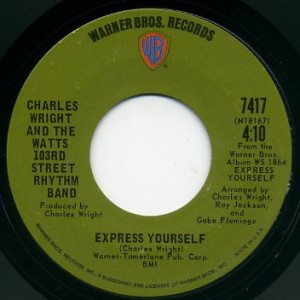
 I suppose I should have posted this last week for your Funky New Year’s Eve pleasure, but there’s always next year, right? Because this week I am happy to provide you with a classic slab of funk that would be right at home, hell indispensable, at any legit soul dance party.
I suppose I should have posted this last week for your Funky New Year’s Eve pleasure, but there’s always next year, right? Because this week I am happy to provide you with a classic slab of funk that would be right at home, hell indispensable, at any legit soul dance party.
Charles Wright was born in Clarksdale, Mississippi. He moved to Los Angeles where he started his musical career singing and playing guitar in Doo Wop groups in the ’50s. Before long he had his own band, Charles Wright & the Wright Side. In a not very interesting side note, one of the members of his band was none other than Daryl Dragon, who later rose to fame as the Captain in the Captain and Tennille.
Several years later Wright had real success with a group called the Watts 103rd St. Rhythm Band, which is a story unto itself. The band’s name was one originally given to a group of LA session musicians by producer and record company owner Fred Smith. Given the nature of the band it’s not hard to understand that the Watts 103rd St. Rhythm Band featured an ever-shifting cast of musicians.
In 1966, Wright was playing with a group of session musicians at the Nashville West studio in LA. When comedian Bill Cosby needed a backing band for an album, Smith hired the Nashville West guys and called them the Watts 103rd St. Rhythm Band. Hey, it was his name, right?
On the strength of the Cosby association, the band got a deal with Warner Brothers. In fact, they were the first R&B band ever signed to the label. They released a couple of albums, and had a national hit with the single “Do Your Thing” from their second album, Together. When Cosby decided to go on tour, Wright put together a Watts 103rd road band for him. The band’s first three albums were credited to the Watts 103rd St. Rhythm Band. It wasn’t until singles were released from that third album, In the Jungle Babe, that Charles Wright got his name up front.
By the late ’60s the band was no longer content with playing covers of R&B hits, and they started to write their own songs. Their funky grooves became a seminal fixture in the nascent funk movement represented by Sly & the Family Stone, and Parliament-Funkadelic.
Major success for Charles Wright & the Watts 103rd St. Rhythm Band came with the single “Express Yourself” in 1970. The record reached #3 on the R&B chart, and #12 on the Pop Chart. It has been repeatedly sampled, soundtracked, and commercialized over the years.
Sadly, by then the band was already fragmenting. Al Jackson left to join Earth, Wind, & Fire, and four other members quit to back Bill Withers. Wright went on to make four solo albums over the next few years. The last time we heard from him was his Finally Got It Wright album in 2007, which featured an update of “Express Yourself.”





Comments